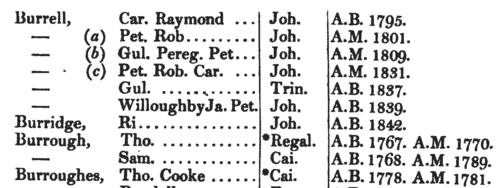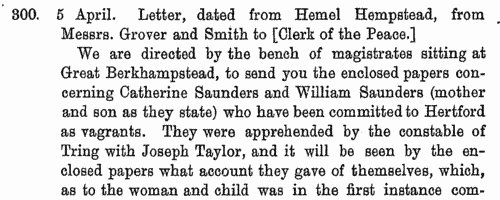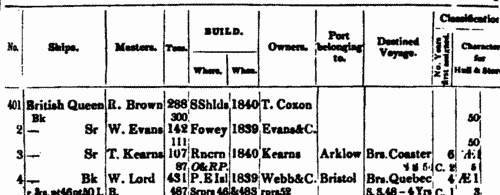Woolfe Surname Ancestry ResultsOur indexes 1000-1999 include entries for the spelling 'woolfe'. In the period you have requested, we have the following 154 records (displaying 111 to 120): Single Surname Subscription | | | Buying all 154 results of this search individually would cost £838.00. But you can have free access to all 154 records for a year, to view, to save and print, for £100. Save £738.00. More... |
These sample scans are from the original record. You will get scans of the full pages or articles where the surname you searched for has been found. Your web browser may prevent the sample windows from opening; in this case please change your browser settings to allow pop-up windows from this site. Irish Insolvents
(1844)
Insolvency notices for Ireland: insolvency often caused people to restart their lives elsewhere, so these are an important source for lost links, especially for emigrantsWOOLFE. Cost: £6.00.  | Sample scan, click to enlarge

| Graduates of Cambridge University
(1760-1846)
Joseph Romilly, registrar of the university of Cambridge, compiled Graduati Cantabrigienses, a catalogue of graduates from the academic year of admissions 1760 through to 10 October 1846. The names are arranged alphabetically by surname, and then chronologically by christian name: the college is given, with an asterisk in those cases where the man became a fellow, and then, in chronological order, his degrees. WOOLFE. Cost: £4.00.  | Sample scan, click to enlarge

| Dissolutions of partnerships in England and Wales
(1846)
Perry's Bankrupt and Insolvent Gazette, issued monthly, included lists of dissolutions of partnerships gazetted in England and Wales. The names of the partners are given in full, surnames in capitals, followed by trade and address, and date of the end of the partnership. Each entry usually ends with the phrase 'Debts by ...', indicating which partner intended to continue, and resume the responsibilities of, the business. This is the index to the names of the partners, from the issues from January to December 1846.WOOLFE. Cost: £6.00.  | Sample scan, click to enlarge

| Hertfordshire Sessions
(1699-1850)
Incidents from the Hertfordshire Sessions Rolls. These cover a wide range of criminal and civil business for the county, with presentments, petitions, and recognizances to appear as witnesses: many of the records concern the county authorities dealing with regulation of alehouses, religious conventicles, absence from church, highways, poaching, profanation of the Sabbath, exercising trades without due apprenticeship &c. Unlike the Sessions Books, the decisions of the justices are not recorded on the rolls, which serve more as a record of evidence and allegations. This is a calendar of abstracts of extracts: it is by no means a completely comprehensive record of the surviving Hertfordshire sessions rolls of the period, but coverage is good. WOOLFE. Cost: £4.00.  | Sample scan, click to enlarge

| Traders and professionals in London
(1851)
The Post Office London Directory for 1851 includes this 'Commercial and Professional Directory', recording about 80,000 individuals. WOOLFE. Cost: £4.00.  | Sample scan, click to enlarge

| Owners of Merchantmen
(1852-1853)
Lloyd's Register of British and Foreign Shipping was issued annually, listing ships that had been surveyed preparatory to being insured. This is the register issued 1 July 1852 and then annotated as ships were re-surveyed through to 30 June 1853. The ships were numbered by the first letter of their name, and then by number alphabetically through the ships' names and within ships of the same name alphabetically by surname of the master. After the name of the ship there is the type of vessel (Bk, barque; Bg, brig; Bn, brigantine; Cr, cutter; Dr, dogger; G, galliott; H, hoy; K, ketch; Lr, lugger; Pol, polacre; S, ship; Sk, smack; Sp, sloop; Sr, schooner; St, schoot; Stm, steamer; Sw, snow; Yt, yacht), master's name (as at the time of the last survey); tonnage; place and year of build; owners; port belonging to; destined voyage; number of years first assigned; and character for hull and stores (e. g., A 1), with the year or month (e. g., 50 for 1850, or 2 for February 1852) of inspection. Underneath some entries details were given of construction and repair, with year - s., sheathed; d., doubled; C., coppered; I. B., iron bolts; c. f., copper fastened; M., sheathed with marine metal; Y. M., sheathed with yellow metal; G., sheathed with galvanised iron; Z., sheathed with zinc; F., felt; C. lm., coppered to light water or ballast mark; C. T., copper bolts substituted for treenails; Cl., clincher; len., lengthened; lrp., large repairs; trp., thorough repairs; Drp., damage repaired; ND., new deck; N TSds., new top-sides; W. C., wales cased; NW., new wales; NB., new bottom; NK., new keel; plk, Plank; N Klsn, new kelson; alm. rb., almost rebuilt; pt O. M., part old materials (timbers or plank); Srprs, some repairs - and, in italics, the timber of the ship is described - A, ash; B B, black birch; Bh, beech; C, cedar; E, elm; F, fir; G, gum; Ght, greenheart; Hk, hackmatack; Hm, hemlock; L, locust; Lh, larch; L O, live oak; M, mahogany; P, pine; P P, pitch pine; R P, red pine; Y P, yellow pine; S, spruce; T, teak; Tam, tamarac; W H, witch hazel; W O, white oak. The sample scan is from the main list. The third column, reserved for masters' names, is not particularly wide; with short surnames, an initial will be given; but longer surnames omit the initials, and even longer surnames are abbreviated. This is the index to owners in the main list. Often a ship would have changed hands by the time of re-survey, and the new owners' names are added in slightly smaller type under the original owners in the seventh column. These new owners are also included in this index. It should be borne in mind that the owners in the main list are those at the time of the respective previous survey for each ship, not necessarily as of 1 July 1852.WOOLFE. Cost: £6.00.  | Sample scan, click to enlarge

| Unclaimed Dividends
(1855)
The unclaimed dividend books of the Bank of England, containing names and descriptions of over 20,000 persons entitled to many millions of pounds accumulated in the bank unclaimed during the 18th and 19th centuries, mostly in consols and annuities, and transferred to the Commissioners for the Reduction of the National Debt.
WOOLFE. Cost: £6.00.  | Sample scan, click to enlarge

| Traders and professionals in London
(1856)
The Post Office London Directory for 1856 includes this 'Commercial and Professional Directory', recording over 100,000 individuals. WOOLFE. Cost: £4.00.  | Sample scan, click to enlarge

|  Persons of standing recommending London police recruits
(1843-1857) Persons of standing recommending London police recruits
(1843-1857)
The Metropolitan Police Register of Joiners (MEPO 4/334) lists policemen joining the force 1 January 1843 to 1 April 1857 (warrant numbers 19893 to 35804). The register is alphabetical, in so far as the recruits are listed chronologically grouped under first letter of surname. It gives Date of Appointment, Name, Number of Warrant, Cause of Removal from Force (resigned, dismissed, promoted or died), and Date of Removal. Although the register was closed for new entrants at the end of 1842, the details of removals were always recorded, some being twenty or more years later. Those recruits not formerly in the police, the army, or some government department, were required to provide (normally) at least two letters of recommendation from persons of standing, and details of these are entered on the facing pages. Where a recruit was only recently arrived in the metropolis, the names and addresses of the recommenders can be invaluable for tracing where he came from. Those recruits not formerly in the police, the army, or some government department, were required to provide (normally) at least two letters of recommendation from persons of standing, and details of these are entered on the facing pages: the names in these are indexed here (the police recruits are indexed separately and not included here). Recruits transferred from other forces or rejoining the force did not normally need recommendations - in the latter case, former warrant numbers are given - but some recommendations are from police inspectors, even other constables. Recruits coming from the army sometimes have general military certificates of good conduct, but most often have a letter from their former commanding officer; recruits recommended by government departments (most often the Home Office) similarly have letters from the head of department. But the great majority of the names and addresses in these pages are of respectable citizens having some sort of personal acquaintance with the recruit. Where more than two recommendations were provided, the clerk would only record one or two, with the words 'and others'. Tradesmen are sometimes identified as such by their occupations; there are some gentry. Although the bulk of these names are from London and the home counties, a scattering are from further afield throughout Britain and Ireland. WOOLFE. Cost: £8.00.  | Sample scan, click to enlarge

| Long-stay Paupers in Workhouses: Strand
(1861)
This comprehensive return by the Poor Law Board for England and Wales in July 1861 revealed that of the 67,800 paupers aged 16 or over, exclusive of vagrants, then in the Board's workhouses, 14,216 (6,569 men, 7,647 women) had been inmates for a continuous period of five years and upwards. The return lists all these long-stay inmates from each of the 626 workhouses that had been existence for five years and more, giving full name; the amount of time that each had been in the workhouse (years and months); the reason assigned why the pauper in each case was unable to sustain himself or herself; and whether or not the pauper had been brought up in a district or workhouse school (very few had). The commonest reasons given for this long stay in the workhouse were: old age and infirm (3,331); infirm (2,565); idiot (1,565); weak mind (1,026); imbecile (997); and illness (493). WOOLFE. Cost: £6.00.  | Sample scan, click to enlarge

|
Research your ancestry, family history, genealogy and one-name study by direct access to original records and archives indexed by surname.
|













